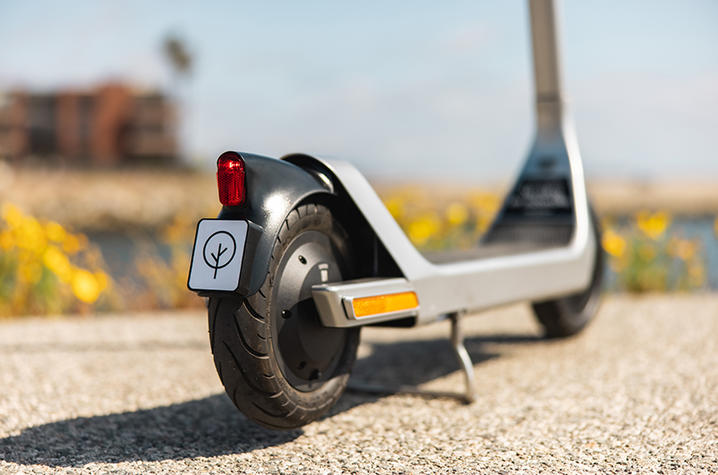A New Breed of Birds Have Landed on Campus

LEXINGTON, Ky. (Dec. 10, 2021) — You may have already noticed that Bird electronic scooters on campus have evolved, with the older model being replaced by a new version that’s more robust and heavier on extra features.
Bird, UK’s preferred e-scooter vendor, recently swapped out its older version with its newest line, Bird Three. These scooters feature a variety of upgrades designed to make the scooters eco-friendlier and to heighten their appeal to both experienced and new riders.
While the fleet number is smaller on campus during the winter, these Birds are expected to be available all season long.
Some of the functional upgrades of the new scooters include:
- Dual independent brakes that allow a shorter stopping distance.
- Autonomous emergency braking.
- A new operating system that enforces adherence to speed limits and reduced speed zones.
- Increased battery life capacity that requires less frequent charging.
- Neck status lights that let riders immediately see a scooter’s charge level.
- Real-time diagnostic monitoring and over-the-air upgrade capabilities.
- A hermetically sealed battery casing that’s both weatherproof and tamper-proof.
Riders will notice that the Birds look different, with a longer wheelbase that the company says provides greater stability and improves riders’ overall comfort. The handlebars are also wider and have antimicrobial grips.
Important new safety features include LED headlights and brake lights, making the scooters easier to see during times of low visibility. These new scooters also feature an anti-tip kickstand and automotive-grade pneumatic tires for a softer ride over different types of surfaces.
“We’ve been astonished at the popularity of e-scooters among students, with over 80,000 rides taking place on campus since early August. As such, we’re very excited to see the new safety features, like rear lights and more robust kickstands, that are now available on these models,” said Sandra Broadwill, UK alternative transportation manager.
According to Scott Rushforth, Bird’s chief vehicle officer, “Every aspect of the Bird Three has been thoughtfully designed to reduce its environmental impact, beginning with a bigger battery that’s more eco-friendly and can power more rides on a single charge than any other shared scooter.”
While the scooters may have changed, the rules of the road have not. While you’re spinning around on the new models, remember to:
- Always yield to pedestrians; dismount to pass when sidewalks are crowded.
- Park your scooter at a bike rack or in a shared mobility area; don’t hamper access to buildings or sidewalks.
- Follow the same rules that drivers of vehicles must observe when riding on the road.
Scooters are also prohibited in buildings and on elevated pedestrian walkways. UK’s policy outlining correct usage and the university’s expectations can be found here.
If you see a problem with a Bird scooter, you can report it in the app. Instructions for how to do so can be found here.
Enjoy the new scooters! If you have questions about them or about scooting on campus in general, email UK Transportation Services at UKBikes@lsv.uky.edu. Sign up for Bike e-news to get all the latest information and follow Transportation Services on Twitter @UKParking and on Facebook @WildcatWheels.
As the state’s flagship, land-grant institution, the University of Kentucky exists to advance the Commonwealth. We do that by preparing the next generation of leaders — placing students at the heart of everything we do — and transforming the lives of Kentuckians through education, research and creative work, service and health care. We pride ourselves on being a catalyst for breakthroughs and a force for healing, a place where ingenuity unfolds. It's all made possible by our people — visionaries, disruptors and pioneers — who make up 200 academic programs, a $476.5 million research and development enterprise and a world-class medical center, all on one campus.




